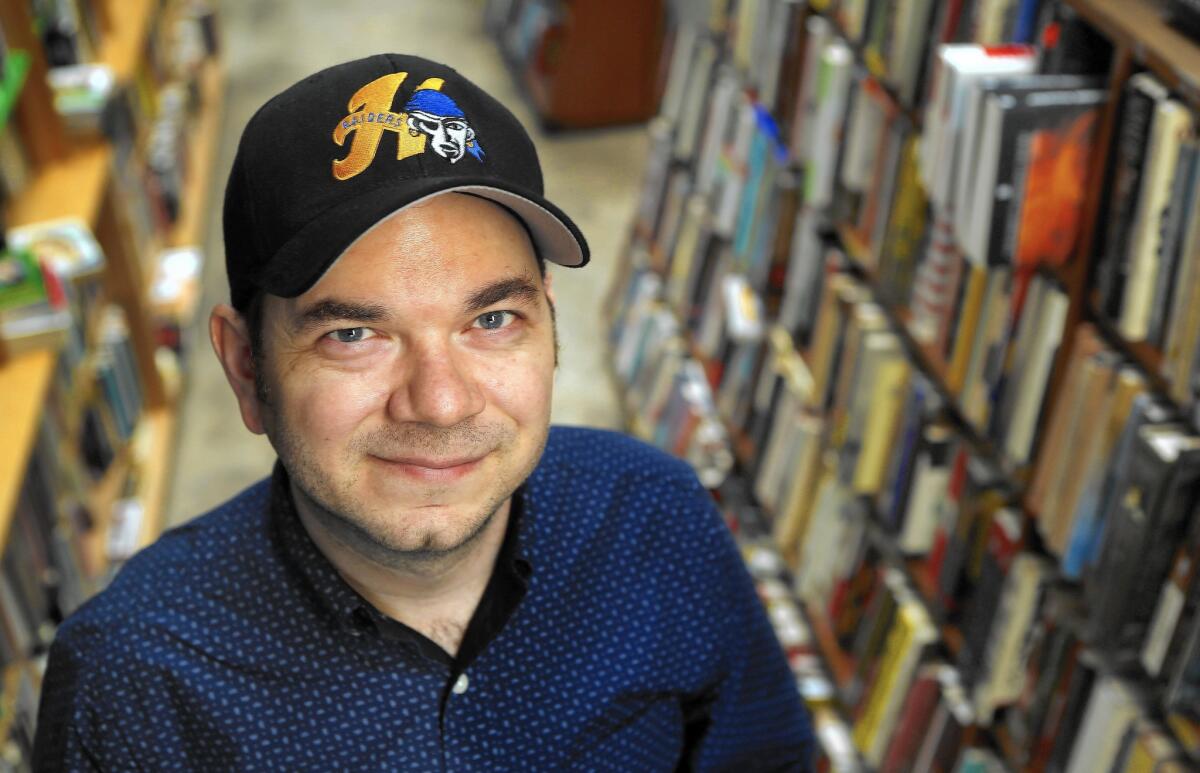‘Kitchens of the Great Midwest’: Just something J. Ryan Stradal whipped up

- Share via
When he was 5, J. Ryan Stradal wrote his name in crayon on the inside jackets of his favorite books. Only he didn’t write “property of”; he wrote “written by.”
Sensing a budding plagiarist in the family’s midst, Stradal’s mother, Karen, quickly disabused him of the practice. You should write your own book, she would say, don’t steal other people’s work.
Thirty-five years later, Stradal’s childhood dream has come to fruition with the publication of his debut novel, “Kitchens of the Great Midwest” (Viking: 310 pp., $25). Dedicated to his mother, who died of cancer 10 years ago and whose love of literature first inspired him as a child, the book is a lively portrait of a disparate group of Midwestern characters viewed through the prism of food and the increasingly complicated role it plays not only in the region but also in modern life.
The North Star in this universe of narratives is a celebrity chef named Eva Thorvald whose circuitous and unlikely rise to fame is thoroughly documented and whose elaborate dinner parties cost $5,000 a head and have an estimated wait time of 295 years after online registration.
Part foodie fantasy, part family drama and all heart, “Kitchens” is peppered with real life Stradal family recipes, including Mom’s Chicken Wild Rice Casserole, penned by Stradal’s grandmother and originally published by the First Lutheran Church of Hunter, N.D.
“I’m an enthusiastic end user of food, but not much of a chef,” Stradal admitted on a recent morning while sipping iced coffee on the patio at Stories Books and Cafe in Echo Park. Despite the summer heat, Stradal wears dark blue jeans, a button-up blue shirt and a Hastings Raiders baseball cap (his high school team). He is energetic, with wide, boyish features and a boisterous laugh that erupts suddenly.
He grew up in Hastings, Minn., (population 22,000) and studied film, television and radio at Northwestern University in Evanston, Ill. — a place he lovingly sends up in a hilarious chapter about Thorvald’s calorie-obsessed cousin, Braque Dragelski, whose mouth is as filthy as her colon is clean. “Braque had never been to Whole Foods this time of the morning before. It was way less slammed with rubes than at lunchtime.... After vomiting, she needed two bananas, reverse-osmosis water, and a protein shake to replenish,” Stradal writes in one of a number of passages that address the near-frantic heights of modern food obsession.
Stradal’s grandmother loved canning fruits and vegetables in the 1950s, but it is unlikely she knew the difference between Northern Xtra Sweet bicolor corn and heirloom Golden Bantam corn, both of which are discussed at length in a chapter that finds a young Thorvald wowing guests at a dinner party with her immaculate palate and otherworldly cooking skills.
Thorvald lives in a world where food, like speculating about the outcome of the 2016 presidential primaries, has become a religion. Stradal’s descriptions are tender morsels that would be at home in any detailed food blog. The ritual of making a Caesar salad tableside is elevated to an art form, and the love and attention put into baking perfect peanut butter chocolate bars becomes a woman’s declaration of self-worth.
“I knew I wanted to tell the story of a dinner party, working backward from the guests who are going to be there,” Stradal says of his conceit for the novel. “How did this assembly of people come to arrive at this place in time?”
Stradal has also been asking himself how he came to arrive in his current situation: that of budding novelist. He has long been active in the Los Angeles literary scene: He co-produces the reading series Hot Dish, acquires books for small publisher Unnamed Press, edited the 2014 California Prose Directory (an anthology of California writers) and is on the advisory board at 826LA, Dave Eggers’ nonprofit youth writing program housed in a storefront on Sunset Boulevard in Echo Park. He’s also the fiction editor at literary website the Nervous Breakdown.
In his other life, he was a story editor for unscripted TV shows on VH1, which he said taught him lessons in efficiency that were valuable to him as a writer.
The speed with which “Kitchens of the Great Midwest” came into the world is remarkable, even so: He wrote it in 364 days from February 2013 to 2014, got an agent after sending out only eight or nine query letters and had a publisher acquire his manuscript in a mere eight days. A year later, he is still pinching himself.
“It’s very strange when you set out to do something in life, especially something that’s pretty hard — and then you do it,” says Stradal. “It’s surreal.”
jessica.gelt@latimes.com
MORE FROM BOOKS:
Get ready to be obsessed by these 29 page-turners
27 nonfiction books you’ll want to read -- and share -- this summer
Listen up: Here are 11 audiobooks you’ll want to ‘read’ this summer
More to Read
Sign up for our Book Club newsletter
Get the latest news, events and more from the Los Angeles Times Book Club, and help us get L.A. reading and talking.
You may occasionally receive promotional content from the Los Angeles Times.









